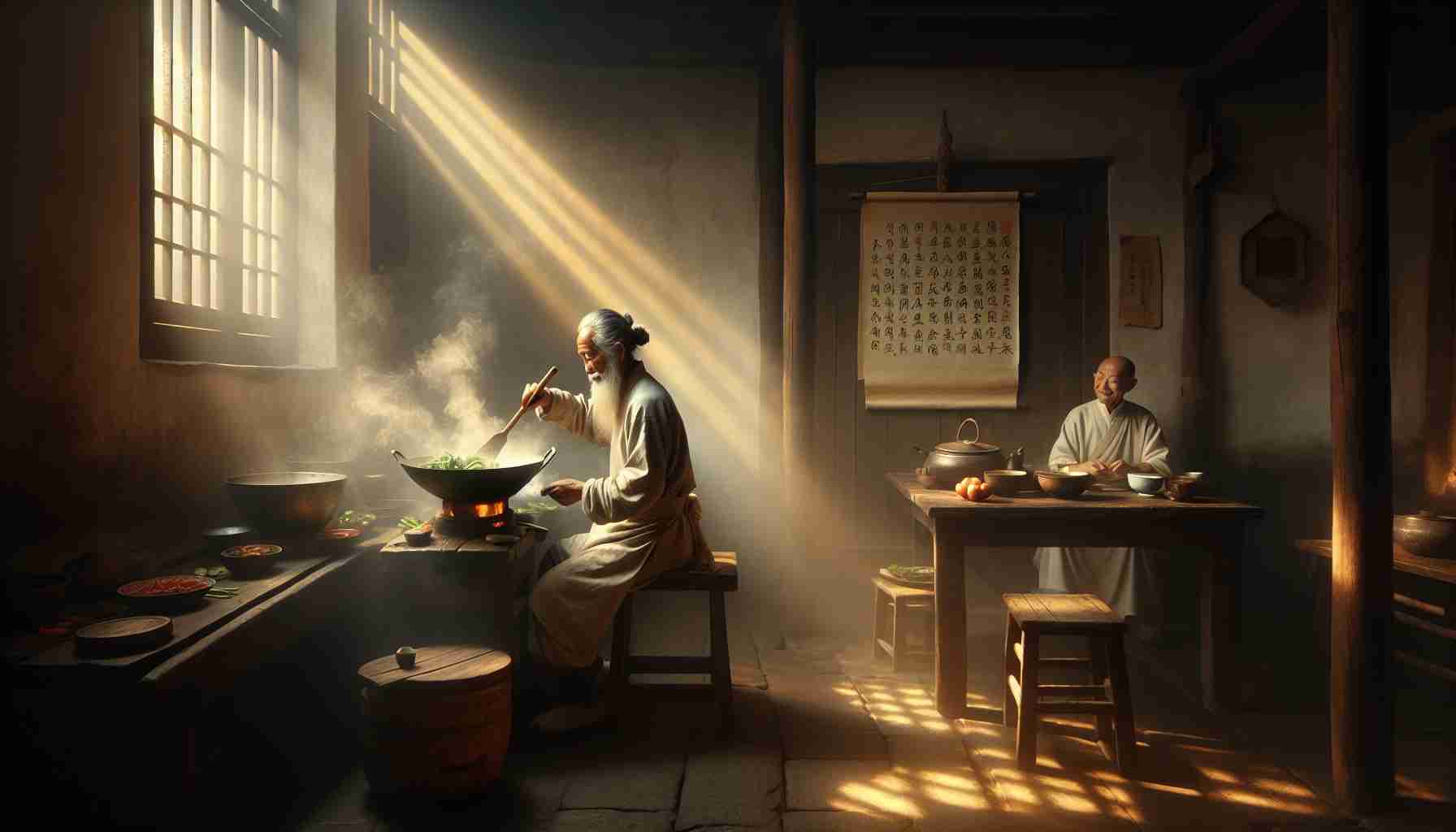

The scent of stir-fried vegetables danced through the air as I leaned over the steaming pot. My name is Bao, and I was just a cook in a quiet village at the foot of the mountains. I never thought something as simple as chopping garlic or boiling rice could teach me about life—but that was before I met Master Li.
Master Li wasn’t from our village. He came from far away, wearing plain robes and carrying nothing but a bamboo walking stick. He never said much, but people always leaned in closer when he did. I first met him when he sat down at my food stall and asked for a bowl of noodle soup.
“It smells like spring rain,” he said, smiling after the first bite. “You cook with care.”
I blushed. “I just follow the recipe my mother taught me.”
He nodded. “Sometimes the greatest wisdom is in small, everyday things.”
For days afterward, Master Li came every morning. He never ordered the same thing twice, and he never spoke unless I did. I began to notice that when I rushed, the food lost its flavor. But when I moved slowly, with focus, everything tasted better.
One day, I was feeling proud. I had prepared my favorite dish with extra spices and fancy garnishes. Master Li took one bite and quietly set his chopsticks down.
I frowned. “Is it not good?”
“You tried too hard today,” he said softly. “Your effort got in the way.”
That confused me. “But I worked harder than ever!”
“It is not always about effort,” he said. “When the butterfly struggles too hard to escape the cocoon, it harms its wings. But when it simply unfolds, it becomes free.”
I didn’t answer. That night, I lay awake thinking about the butterfly.
From then on, I stopped trying to impress. I focused on each ingredient, not the result. I listened to the rhythm of the water boiling and the sound of the knife slicing through onions. I moved with the flow of the work, not against it.
Weeks passed. One morning, Master Li did not return. I asked around, but nobody had seen him. He had vanished like mist in the hills.
But he had left something behind—the way he looked at the world, and the way he had helped me see it too.
Now, I still cook at the same stall. But each pot of soup is a lesson in the Tao. I no longer try to make each dish perfect. I let the ingredients lead. I use what I have, in the moment, with care but not control.
That day, I learned cooking wasn’t just about food. It was about life, and the Way of letting things be. I still stir, chop, and boil—but now, I smile when I do, because I understand something I didn’t before.
The Tao is like cooking. When you stop forcing it, everything begins to taste just right.
The scent of stir-fried vegetables danced through the air as I leaned over the steaming pot. My name is Bao, and I was just a cook in a quiet village at the foot of the mountains. I never thought something as simple as chopping garlic or boiling rice could teach me about life—but that was before I met Master Li.
Master Li wasn’t from our village. He came from far away, wearing plain robes and carrying nothing but a bamboo walking stick. He never said much, but people always leaned in closer when he did. I first met him when he sat down at my food stall and asked for a bowl of noodle soup.
“It smells like spring rain,” he said, smiling after the first bite. “You cook with care.”
I blushed. “I just follow the recipe my mother taught me.”
He nodded. “Sometimes the greatest wisdom is in small, everyday things.”
For days afterward, Master Li came every morning. He never ordered the same thing twice, and he never spoke unless I did. I began to notice that when I rushed, the food lost its flavor. But when I moved slowly, with focus, everything tasted better.
One day, I was feeling proud. I had prepared my favorite dish with extra spices and fancy garnishes. Master Li took one bite and quietly set his chopsticks down.
I frowned. “Is it not good?”
“You tried too hard today,” he said softly. “Your effort got in the way.”
That confused me. “But I worked harder than ever!”
“It is not always about effort,” he said. “When the butterfly struggles too hard to escape the cocoon, it harms its wings. But when it simply unfolds, it becomes free.”
I didn’t answer. That night, I lay awake thinking about the butterfly.
From then on, I stopped trying to impress. I focused on each ingredient, not the result. I listened to the rhythm of the water boiling and the sound of the knife slicing through onions. I moved with the flow of the work, not against it.
Weeks passed. One morning, Master Li did not return. I asked around, but nobody had seen him. He had vanished like mist in the hills.
But he had left something behind—the way he looked at the world, and the way he had helped me see it too.
Now, I still cook at the same stall. But each pot of soup is a lesson in the Tao. I no longer try to make each dish perfect. I let the ingredients lead. I use what I have, in the moment, with care but not control.
That day, I learned cooking wasn’t just about food. It was about life, and the Way of letting things be. I still stir, chop, and boil—but now, I smile when I do, because I understand something I didn’t before.
The Tao is like cooking. When you stop forcing it, everything begins to taste just right.